10 Animals That Could Attack Your Dog
There are plenty of other wild animals that can pose a significant threat to your dog, including:
- Coyotes
- Snakes
- Cougars
- Raccoons
- Squirrels
- Porcupines
- Skunks
- Groundhogs
- Javelinas
- Scorpions
Your dog is vulnerable to a deadly attack by a wild animal. Here are some of the animals that require caution for the safety of your dog.
1. Coyotes
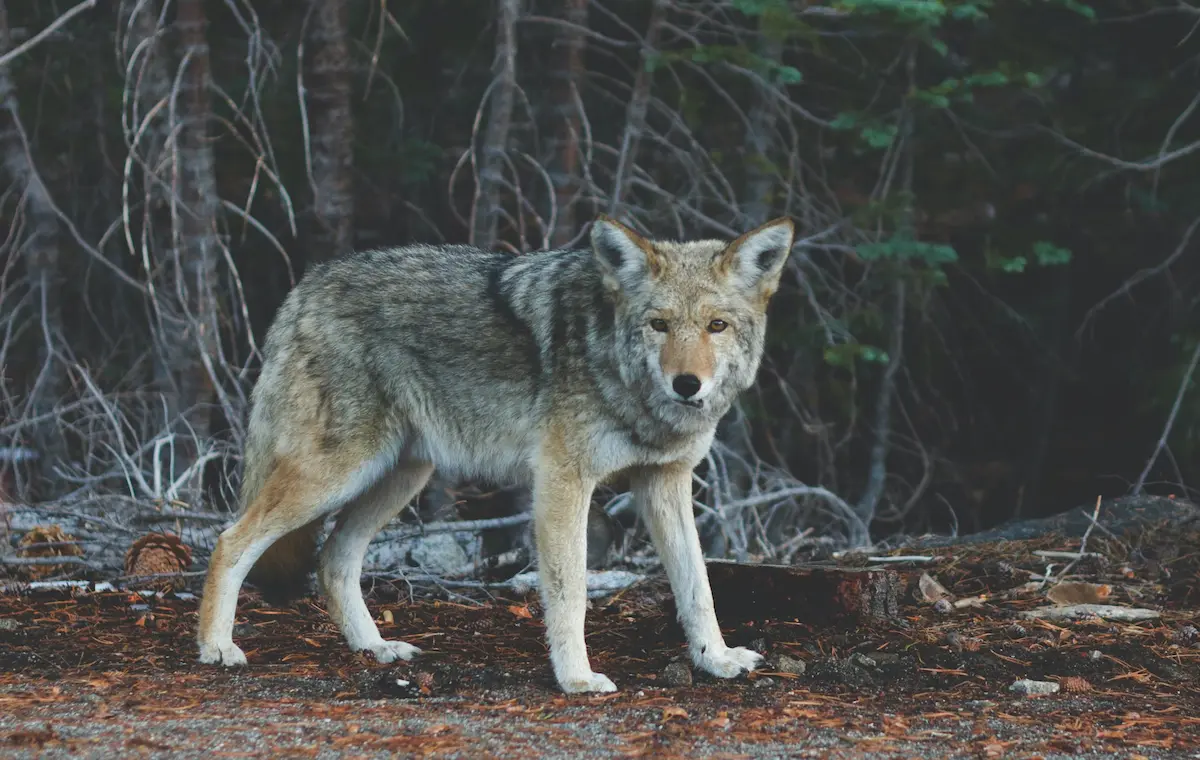
Every summer, many dogs go missing and are lost to coyotes. You may come across a coyote in a national park, river corridors, and even cemeteries. Those who live in rural areas often spot coyotes on their properties.
Coyotes typically attack to injure to kill their prey. So, if you live in a coyote country, you should not let your small dog out overnight. Do not leave leftover food out overnight, as this attracts coyotes. Also, secure your trash, as these coyotes are resourceful scavengers.
2. Snakes
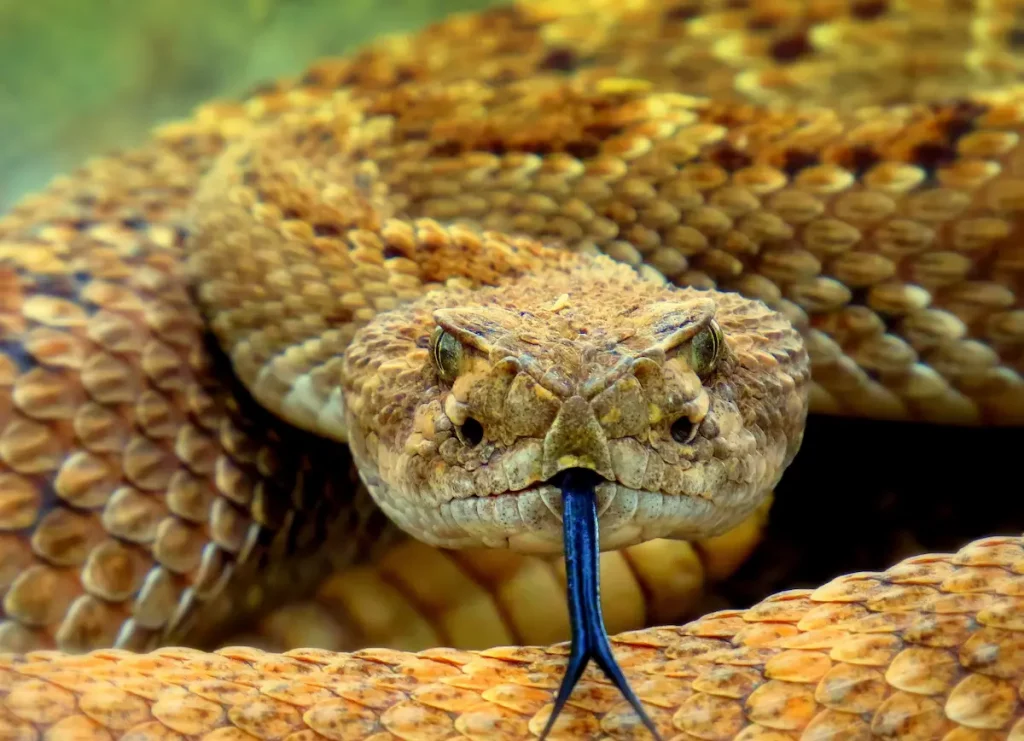
Venomous snakes are dangerous to people and to dogs. They pose another lurking danger to your pet. A snake bite itself would not injure your dog seriously. However, the poison that is injected into them during the bite could be deadly.
Attacks by snakes most often occur when your dog is moving about through grass and sniffing through burrows. Venomous snakes live in most forests, parks, and other public places throughout North America. If your dog is bitten by a snake, immobilize it, and bring it to your vet immediately.
3. Cougars
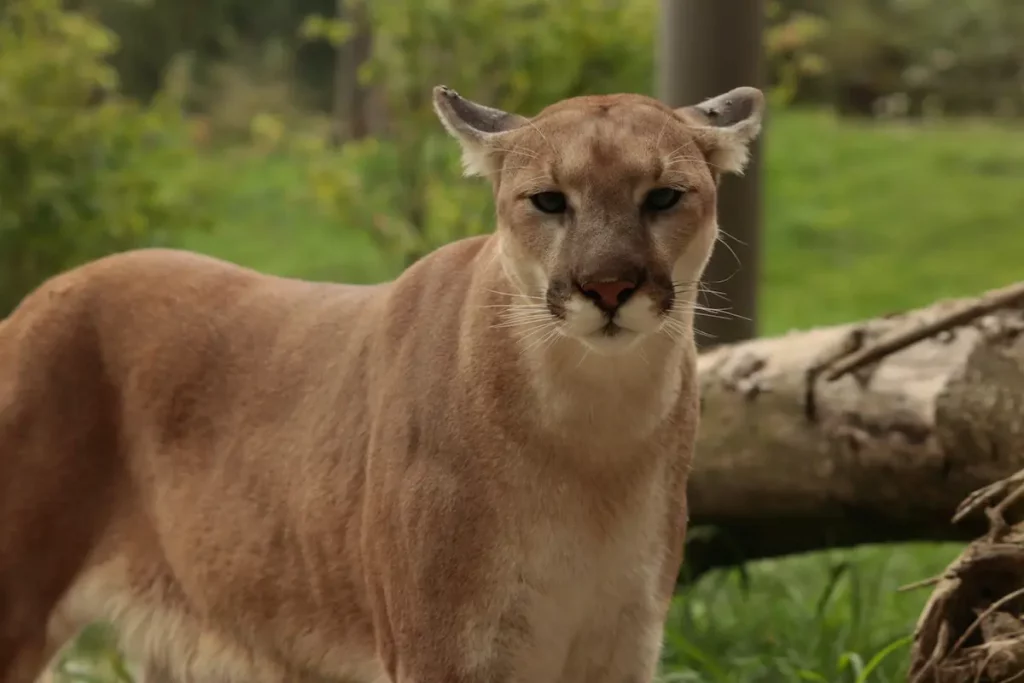
Cougars, also known as mountain lions or pumas, pose a serious danger for outdoor dogs. Cougar attacks on dogs aren’t necessarily aggressive behaviour. They see pet cats and dogs as a food source. These animals were once near extinction, but the sightings are trending upward throughout the west and southwest areas of the United States. Cougars are more interested in hunting livestock, they will attack a dog if an opportunity arises.
If you see a cougar on your property, notify animal control or the police immediately. If you do come across a cougar on a hiking track, remain calm and give the big cat a chance to flee, if it’s cornered. Back away slowly and keep your eye on it. If you are attacked, you must fight back with any means necessary. If you do not have a weapon, use sticks, rocks, or whatever is on hand. If you have to fight, aim for the eyes and face.
4. Raccoons
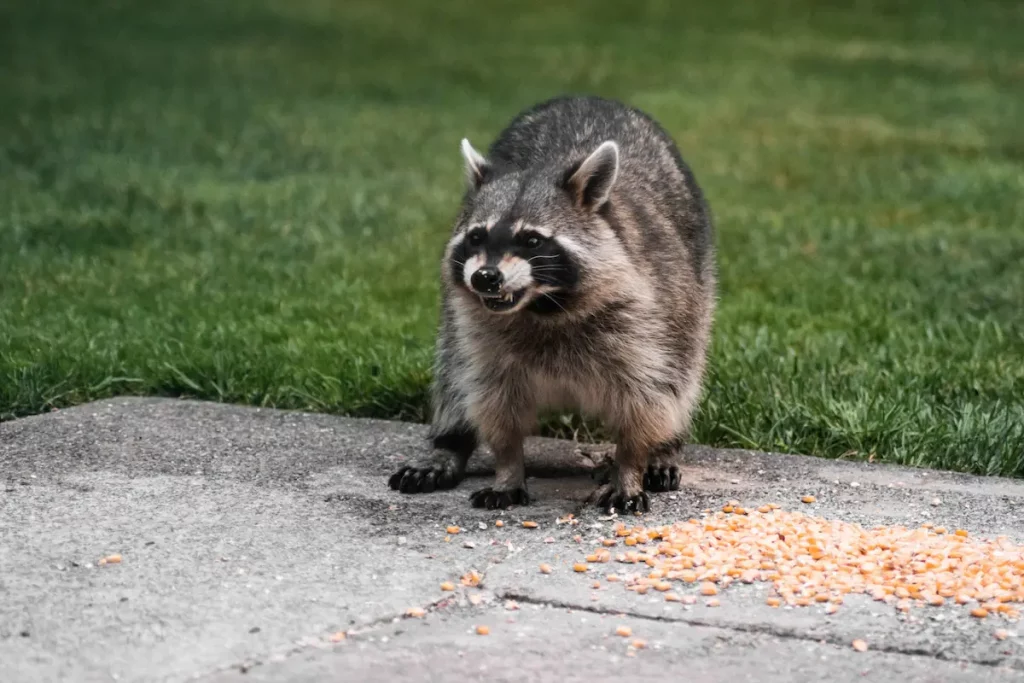
Raccoons pose a danger to your dog, even in urban environments. Their primary danger to your dogs is that they carry diseases, specifically rabies. All a raccoon must do is bite your dog to cause injury and a risk of illness. It is best to keep dogs far away from raccoons to minimize the danger of getting rabies.
Raccoons are attracted to open garbage cans or any food that is left out for dogs. If you live in an area with a high raccoon population, keep your trash cans sealed. Don’t feed your dog outside and avoid leaving food in your yard. This will minimize the chance that raccoons will enter your yard.
5. Squirrels
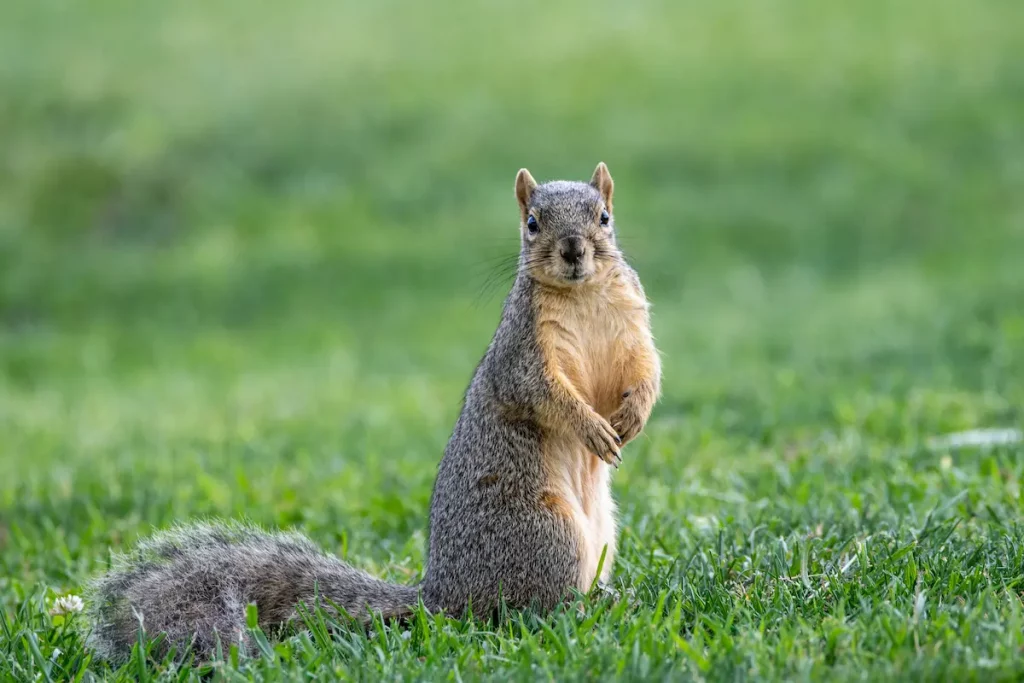
Squirrels look innocent and cute but they can also be quite feisty. Most squirrel attacks arise when a dog attempts to catch it. A squirrel can scratch or bite your dog if it has to defend itself. The sharp teeth and claws can damage your pet’s soft tissue. This often results in a trip to the vet.
Dogs love to chase squirrels and frequently win the chase. You can’t do much to prevent your dogs from chasing squirrels, but you can relocate squirrels or discourage them from entering your property. The best way to prevent injury from a squirrel is to be mindful of your dog when it’s outdoors and you will have a healthier, safer pet
6. Porcupines
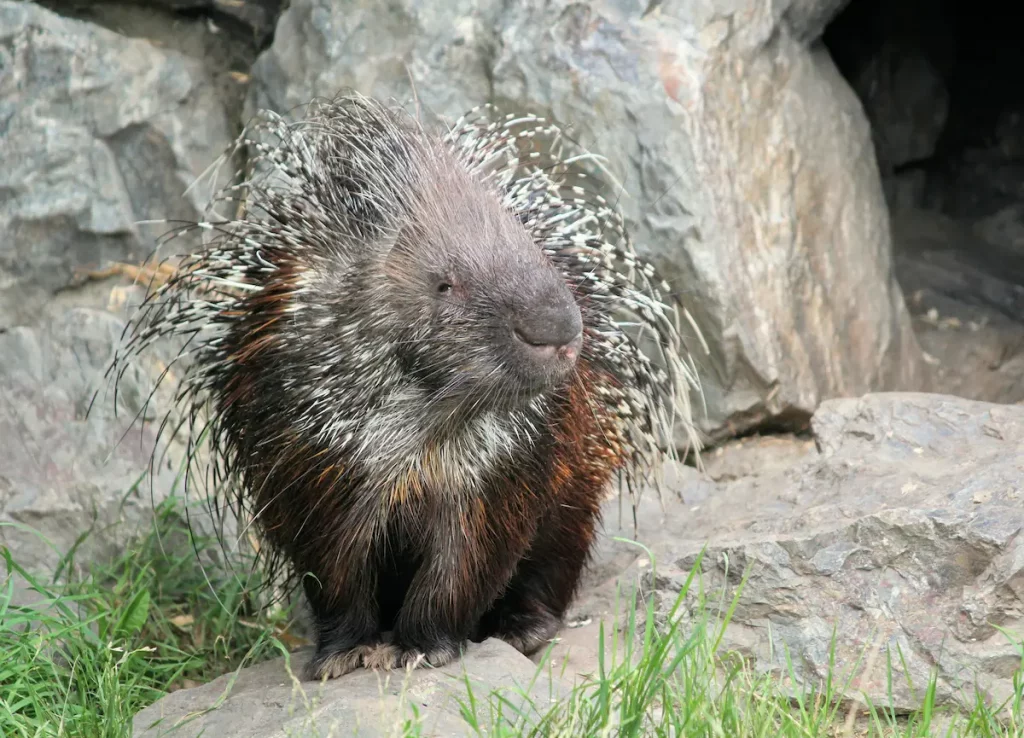
Porcupines are the prickliest of all rodent species. They have coats covered in sharp quills that help protect them from predators. If a dog were to attack a porcupine, the slightest touch can lodge dozens of quills in the dog’s body.
Large quills near sensitive areas can cause difficulty for the dog if removed in an improper manner. If your dog is attacked by a porcupine, have a vet remove the quills. Your curious dog will require unpleasant hours at the vet to remove the quills.
7. Skunks
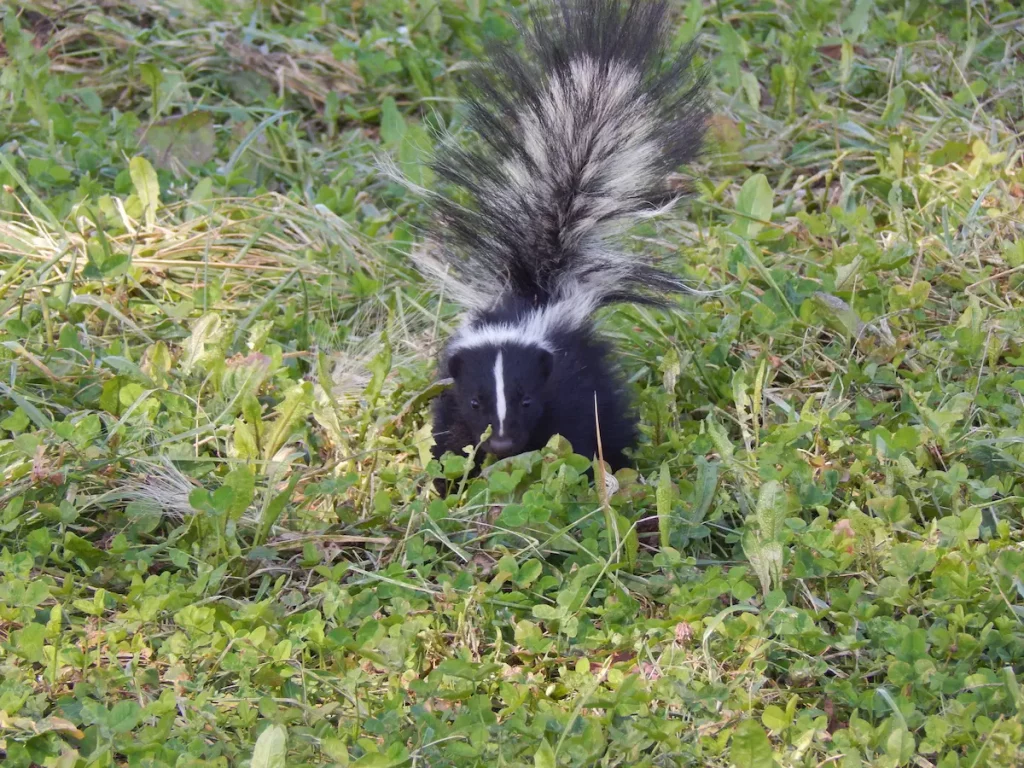
Skunks are legendary for their powerful predator-deterrent foul spray. If your dog encounters a skunk in the wild, it will be treated to a smell as unpleasant as a punch in the stomach. Skunks also have very powerful front claws that they use to burrow. They can very quickly be turned against your dog if the skunk feels threatened.
Skunks will usually only attack when cornered by a dog or defending their young ones. If the dog does not leave, the skunk will then lift its tail and spray its famous skunk odour. Skunks can also be carriers of rabies.
8. Groundhogs
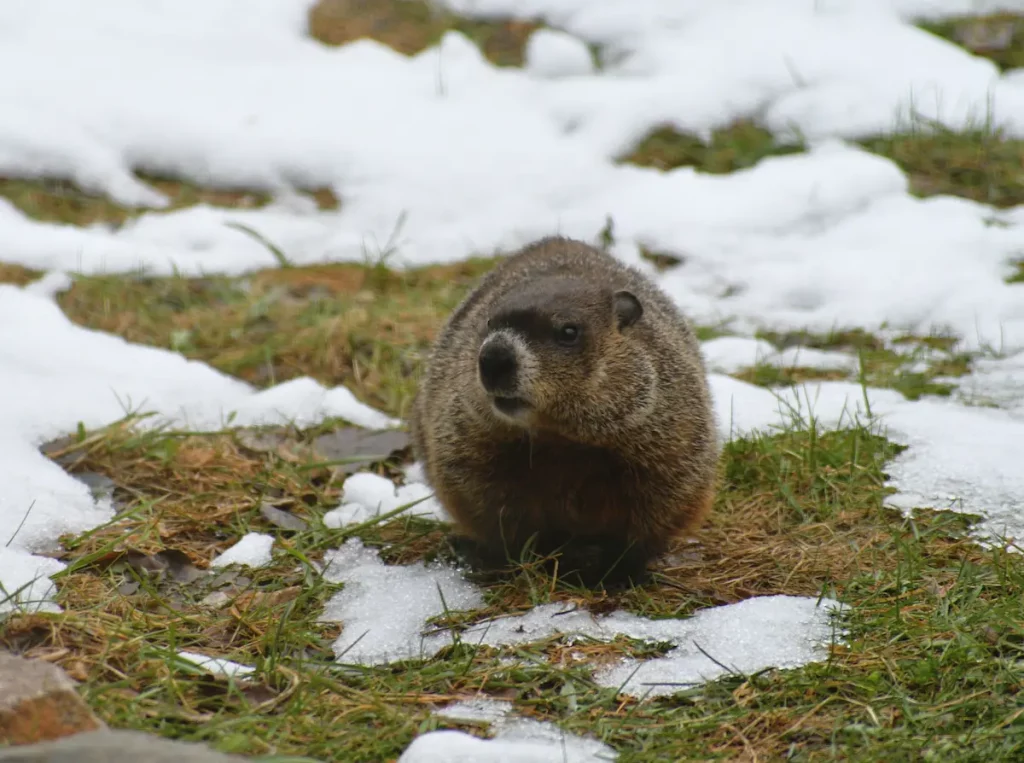
Groundhogs generally do not chase after and attack dogs. But if a dog chases and catches them, they will attack with all their might. Their huge and powerful claws and sharp teeth make for excellent weapons when fighting for their defense.
Small breed dogs do not have the power to overwhelm a groundhog. They are also unable to attack from above and get a good hold on the groundhog’s neck. While a groundhog likely will not kill your fur buddy, they can cause serious damage that requires a vet’s immediate care.
9. Javelinas
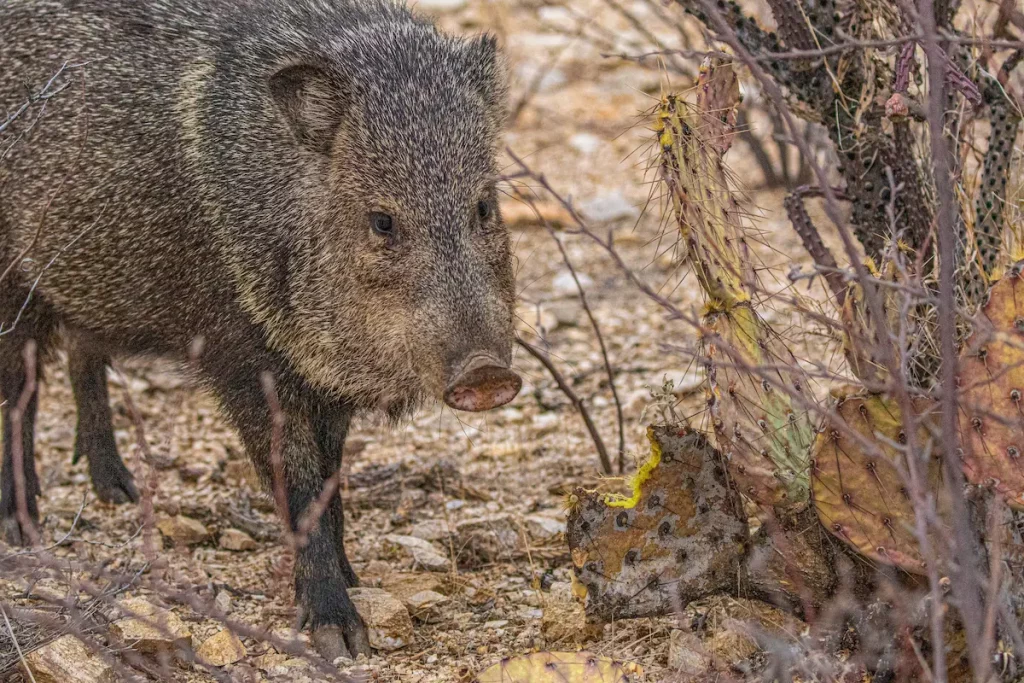
Javelina, also known as a collared peccary, is a land mammal. It is a distant relative of wild pigs and originated in South America. They have huge, sharp tusks that can easily pierce the skin like a knife. They consider dogs and coyotes a natural enemy.
If your dog gets punctured tusks of a Javelina, while on a nature hike, you will probably have a long way to go to find veg for assistance. The delay in treatment can turn a serious injury into a death. If you see javelina while walking with your dog, quickly lead the dog in a different direction because Javelina can attack if it believes it is cornered.
10. Scorpions
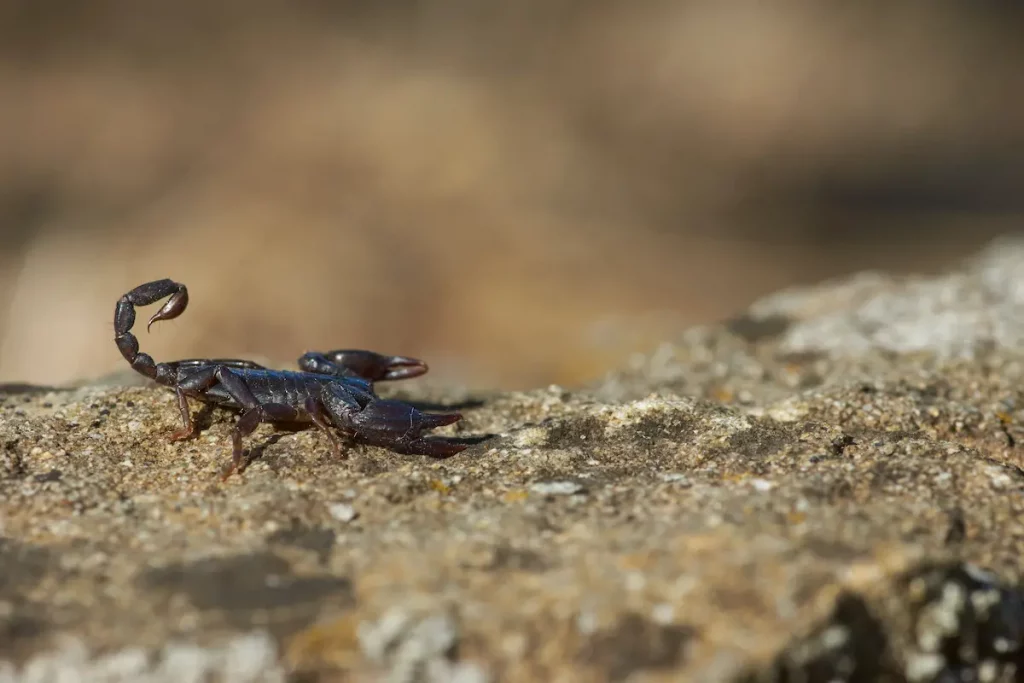
Scorpions insert a venom into their victims that can make them seriously ill, if not kill them. The victims include humans, dogs, cats, and many other animals.
If your dog gets stung by a scorpion, you may hear them yelp in pain. A scorpion attack results in serious pain, swelling, and inflammation in the affected area and sometimes, serious illness. As the venom circulates through their body, you may begin to see dilated and watery eyes, drooling, tremors, difficulty breathing, and even collapse.
How to protect your dog from predators
As caring dog owners, we do everything possible to keep our furry companions out of harm’s way. Learning how to prevent an attack and protect our dogs from predators can make all the difference.
So, what should you do if you see one of these predators in your yard?
Stay calm and follow these tips to keep your beloved fur baby safe:
- Secure your space: The best way to keep your dog safe from predators is to secure the perimeter of your outdoor space. When you live right up against wilderness of any size, this is the first defense in keeping your dog from meeting any predators up close.
- Avoid walks at dusk and dawn: Dusk and dawn are the prime hunting times for a lot of animals. try to avoid walking your dog at dusk and dawn. If they must go out, don’t let them run loose. Keep your dog on a leash at all times and close to your body.
- Don’t leave your dog outside unsupervised: If you know there are wild animals in your area, you should always keep an eye on your dog when it’s outside. This is applicable even if you have a fenced yard. Some predators can climb over or find a break in the fence. Don’t chain your dog outside, as this will make your pooch an easy target for predators.
- Clean up food and waste: Remember not to lead a predator to your pet with simple mistakes like leaving their food outside. Remove anything from around your house that might be tempting to a predator. This includes trash, barbeque grill drippings, and fruits that have fallen from trees in your yard.
Scent-based clues will attract a predator to your area if you aren’t careful. Predators can also smell dog poop. So, make it a habit to clear your yard of droppings on a daily basis. While you’re cleaning up the yard, also clear low overhanging branches, brush, or other areas where a small predator might take up residence. Make sure all outdoor trash cans are sealed so you’re not giving animals an open invitation.
- Keep dogs inside overnight: Keeping your dog indoors overnight is also very important for their safety from wild animals. Even though large breeds can defend themselves, they might pick up a disease from an encounter. At the very least, dogs need a safe space to protect them from the elements or predators.
- Make sure your dog is wearing ID: If your dog is attacked or threatened by a wild animal, it might take off running away from your house. Your dog should have at least an ID tag with current contact information securely attached to its collar. Also, consider microchipping your furry pal.
Related Reading: What Eats Dogs? (Animals, Nations)
Know what to do in case of an attack
In the event of an animal attack, your best bet is to scare the predator away. Keep pepper spray or an air horn nearby. They can help you to frighten a predator from a safe distance. Also, use a baseball bat or wood stick to separate your pet and the predator if required.
It is a great idea to read about wildlife laws in your area. You might be charged if you harm a protected or endangered wild animal while protecting your dog.
Losing your beloved dog to a wild animal attack is a dog parent’s worst nightmare. So, it’s important to take the necessary precautions to avoid such an accident. Educate yourself, your friends, and your family on the best ways to protect your dogs from predators.
Make a First Aid Kit
It’s a good idea to have a first aid kit specifically for your dog. This will help you to provide emergency treatment if a vet is not immediately available. Dog first aid kit includes basics, such as gauze pads, gauze rolls, tweezers, non-latex gloves, bandage, thermometer, and saline solution. These dog first-aid kit essentials also include your dog’s vet records as well as contact information for your vet.
In case of an attack, you should get your dog to the vet as soon as possible. Remember, preventing your dog from being attacked by a wild animal in the first place is far better than having to seek medical treatment after an attack occurs. So, be vigilant and take precautions to keep your four-legged companion safe.
Some of the links in this post are affiliate, and we may earn a commission.
Continue Reading: 10 Best Breeds of Guard Dogs
Final thoughts
Animal encounters can sometimes be unavoidable. However, you can keep things to a minimum by not inviting predators to your dog’s space. Protecting your dog is all about setting their space and environment up for success. Using these tips and techniques gives you the start you need for a vital safety plan.
With a little effort and attention to detail, you can keep your dog protected from predators. When living in residential neighbourhoods, most people don’t have to worry about predators. If you live on a farm or in a rural area, you may have more work to do.
Have you and your dog ever encountered a predator? If so, share your story with us. We would be happy to hear from you!

Family Dog Expert Author
Hi there! I’m Stuart, a devoted dog lover and family dog expert with over a decade of experience working with our furry companions. My passion for dogs drives me to share my knowledge and expertise, helping families build strong, loving bonds with their four-legged friends. When I’m not writing for SirDoggie, you’ll find me hiking, playing with my beautiful dog, or studying music.


